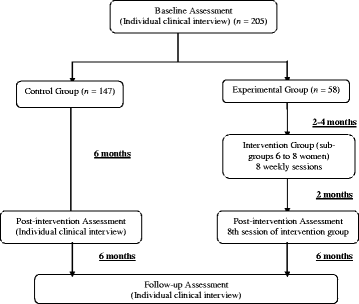Protocol for the psychotherapeutic group intervention for facilitating posttraumatic growth in nonmetastatic breast cancer patients
- PMID: 27142443
- PMCID: PMC4855893
- DOI: 10.1186/s12905-016-0302-x
Protocol for the psychotherapeutic group intervention for facilitating posttraumatic growth in nonmetastatic breast cancer patients
Abstract
Background: Breast cancer can be perceived as a traumatic event with disturbing effects on psychological domains such as depression, anxiety, and Posttraumatic Stress Disorder. In contrast, growing evidence has shown that posttraumatic growth can occur as a result of coping with breast cancer. Challenging the assumptive world, deliberate rumination, and emotional disclosure are recognized as strong predictors of posttraumatic growth. Group interventions may also increase social support, distress disclosure, and posttraumatic growth. The aim of this study is to evaluate how group-based interventions can facilitate posttraumatic growth and promote improved psychosocial adjustment to breast cancer. This article describes the study protocol and the applied research methods.
Methods: To measure the impact of a group-based intervention on posttraumatic growth, a multi-center randomized control trial was developed for Portuguese breast cancer patients. 205 women with nonmetastatic breast cancer (stages 1 to 3) were recruited for the study and were randomly assigned either to the experimental group, which participated in an 8-session group intervention, or to the control group. Psychosocial variables, which consisted of posttraumatic growth, illness perception, stressfulness of the event, Posttraumatic Stress Disorder, core beliefs, rumination, social support, and distress disclosure were measured at three time points. The designated points in time for the assessments were baseline, 6 months post-intervention, and follow-up (12 months after baseline).
Discussion: This study is the first trial to assess the efficacy of a group-based intervention designed to facilitate posttraumatic growth following a breast cancer diagnosis. If proven to be effective, group-based intervention could be recommended as a complementary program to be included in hospital health-care and clinical practice.
Trial registration: The trial was registered on 28/10/2013 at the Current Controlled Trials ( ISRCTN02221709 ).
Keywords: breast cancer; group intervention; posttraumatic growth.
Figures
Similar articles
-
Effects of nurse-led supportive-expressive group intervention for post-traumatic growth among breast cancer survivors: A randomized clinical trial.J Nurs Scholarsh. 2022 Jul;54(4):434-444. doi: 10.1111/jnu.12752. Epub 2021 Dec 13. J Nurs Scholarsh. 2022. PMID: 34898001 Clinical Trial.
-
Exploring the relationship between posttraumatic growth, cognitive processing, psychological distress, and social constraints in a sample of breast cancer patients.Women Health. 2016 Aug-Sep;56(6):650-67. doi: 10.1080/03630242.2015.1118725. Epub 2015 Nov 25. Women Health. 2016. PMID: 26605785
-
Protocol for the Optimune trial: a randomized controlled trial evaluating a novel Internet intervention for breast cancer survivors.Trials. 2020 Jan 29;21(1):117. doi: 10.1186/s13063-019-3987-y. Trials. 2020. PMID: 31996235 Free PMC article.
-
Psychosocial factors related to posttraumatic growth in breast cancer survivors: a review.Women Health. 2014;54(6):569-92. doi: 10.1080/03630242.2014.899543. Women Health. 2014. PMID: 24911117 Review.
-
[Posttraumatic stress disorder (PTSD) as a consequence of the interaction between an individual genetic susceptibility, a traumatogenic event and a social context].Encephale. 2012 Oct;38(5):373-80. doi: 10.1016/j.encep.2011.12.003. Epub 2012 Jan 24. Encephale. 2012. PMID: 23062450 Review. French.
Cited by
-
The effectiveness of group problem-solving therapy on women's sexual function and satisfaction after mastectomy surgery.BMC Womens Health. 2022 Feb 23;22(1):50. doi: 10.1186/s12905-022-01628-x. BMC Womens Health. 2022. PMID: 35197028 Free PMC article.
-
Relationship between sense of coherence and subjective well-being among family caregivers of breast cancer patients: a latent profile analysis.Front Psychiatry. 2025 Jan 21;15:1515570. doi: 10.3389/fpsyt.2024.1515570. eCollection 2024. Front Psychiatry. 2025. PMID: 39906679 Free PMC article.
-
Group Intervention Program to Facilitate Post-Traumatic Growth and Reduce Stigma in HIV.Healthcare (Basel). 2024 Apr 26;12(9):900. doi: 10.3390/healthcare12090900. Healthcare (Basel). 2024. PMID: 38727457 Free PMC article.
-
The Effect of Cognitive-Emotional Training on Post-traumatic Growth in Women with Breast Cancer in Middle East.J Clin Psychol Med Settings. 2019 Mar;26(1):25-32. doi: 10.1007/s10880-018-9561-z. J Clin Psychol Med Settings. 2019. PMID: 29572619
-
The mediating and moderating roles of resilience in the relationship between anxiety, depression, and post-traumatic growth among breast cancer patients based on structural equation modeling: An observational study.Medicine (Baltimore). 2020 Dec 11;99(50):e23273. doi: 10.1097/MD.0000000000023273. Medicine (Baltimore). 2020. PMID: 33327251 Free PMC article.
References
-
- Cordova MJ, Giese-Davis J, Golant M, Kronenwetter C, Chang V, Spiegel D. Breast cancer as trauma: posttraumatic stress and posttraumatic growth. J Clin Psychol Med Settings. 2007;14(4):308–319. doi: 10.1007/s10880-007-9083-6. - DOI
-
- Fors EA, Bertheussen GF, Thune I, et al. Psychosocial interventions as part of breast cancer rehabilitation programs ? Results from a systematic review. Psychooncology. 2011;20:909–18. doi:10.1002/pon.1844. - PubMed
Publication types
MeSH terms
Associated data
LinkOut - more resources
Full Text Sources
Other Literature Sources
Medical


